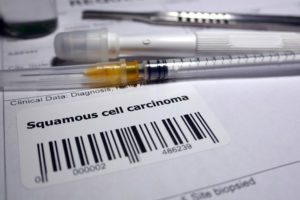New Options for Skin Cancer Treatment Brings New Hope for Patients with Squamous Cell Carcinoma
- Posted on: Oct 15 2021
 If there’s anything that a person diagnosed with skin cancer needs, it’s hope. Here at the American Society for Mohs Surgery, this is one of our ultimate goals. Through clinical training and peer associations, dermatologists can strengthen their knowledge base and skillset to provide patients with just that hope. Additionally, they can provide patients with the very treatment that is considered the gold standard for skin cancer. Here, we discuss the treatment options currently available for advanced stage SCCs.
If there’s anything that a person diagnosed with skin cancer needs, it’s hope. Here at the American Society for Mohs Surgery, this is one of our ultimate goals. Through clinical training and peer associations, dermatologists can strengthen their knowledge base and skillset to provide patients with just that hope. Additionally, they can provide patients with the very treatment that is considered the gold standard for skin cancer. Here, we discuss the treatment options currently available for advanced stage SCCs.
Approximately 95 percent of the SCCs that are diagnosed are in their early stages. This makes them easier to treat and it may reduce the extent of treatment that is needed. It is good news that only 5 percent of squamous cell carcinomas reach their advanced stages. However, these cases account for approximately 15,000 deaths in the United States each year. In addition to continuing to promote routine skin cancer screenings, dermatologists can assist their patients by understanding the latest and most effective treatment protocols.
What is advanced SCC?
Advanced squamous cell carcinoma is described as an SCC that has resisted treatments and recurred repeatedly or as one that has spread quickly and extensively. Examples of advanced SCCs include:
- A tumor that has grown into deep tissues, including the nerves or muscles. These tumors can cause disfigurement or concerns with underlying structures.
- A tumor that has spread to one or more areas of the body away from the original site. This is referred to as a metastatic SCC. Metastatic skin cancers can be life-threatening.
Patients who have been diagnosed with advanced SCC often have a multidisciplinary care team. This may include their dermatologist and, if their dermatologist is not a Mohs surgeon, a dermatologist who also specializes in Mohs surgery. Due to the complexity of the disease, the treatment regimen may not be limited to surgical removal of the diseased tissue. Additional therapies that a patient may receive include radiation therapy and/or immunotherapy.
Treatment Options for Advanced SCCs
The care team may determine that one or more of the following approaches are appropriate based on the severity of the disease:
- Excisional surgery, which involves the removal of a tumor as well as some extra tissue surrounding the growth. In this approach, the tissue is sent to a lab for examination to ensure that all cancerous tissue has been removed.
- Mohs surgery, which is a longer procedure than excisional surgery, but more conservative. Mohs surgery involves the removal of tissue in layers. Each layer is immediately examined in an on-site lab. The procedure continues until lab examination confirms that all cancerous tissue has been removed.
- Radiation therapy destroys cancer cells using low-energy x-ray beams. This treatment may require multiple sessions. It has historically been needed for larger SCCs and for those that are difficult to treat with surgery. Patients who undergo Mohs micrographic surgery are less likely to require post-treatment radiation therapy.
- Immunotherapy is a newer treatment that may be necessary to halt metastatic skin cancer from continuing to spread. This medication works by blocking the PD-1 “checkpoint” in the immune system, freeing the body to produce an abundance of T cells to destroy cancer cells.
Elevate your dermatology practice with training in Mohs Micrographic Surgery. Contact us at (800) 616-2767 for information regarding membership and upcoming educational events.
Posted in: Basal & Squamous Cell Carcinoma, Skin Cancer


